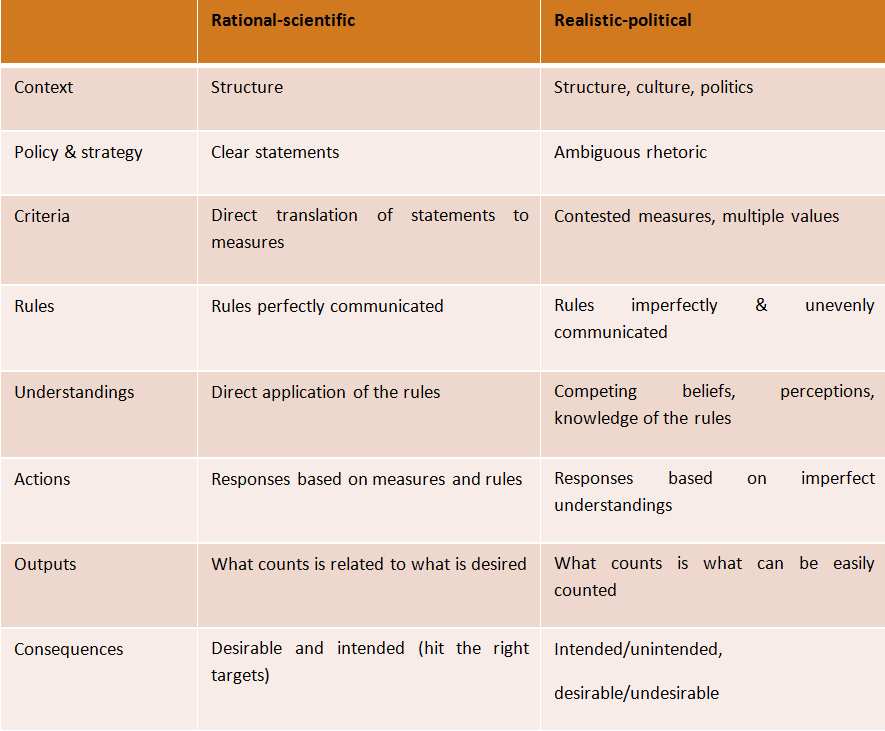Governance by Metrics

Measuring performance is now firmly entrenched as a means of demonstrating that public sector organizations are achieving what they are meant to, are producing value for money, and are being held accountable to various audiences. A flourishing industry of performance indicators and performance management frameworks exists, and management gurus tout their various 5-point plans for getting the most out of organizations and individuals using performance frameworks.
Behind all of this, is the search for rationality. Some appear to genuinely view organizations as machines that can be tinkered with so that they produce the desired outputs. Others are more interested in individuals and getting the most out of them, in line with the objectives of the organization. For some, the symbolism of measurement is what is important, and the aim is merely to produce a performance that is in line with the expectations of a rationally structured and functioning organization. And the list goes on. Meanwhile, sceptics have spent considerable time and effort describing the undesirable consequences of performance measurement systems.
Even if the smartest minds are put to work creating robust measures, for all the best of reasons, performance measurement suffers from multiple challenges in technicalities (how can we get close to the actual outcome of interest?) and in its implementation (how can we know that it will be used more than ceremonially?). But these challenges do not address the inherent power issues involved in the decision to measure performance, nor do they deal with the its consequences for individuals, organizations, and systems.
Performance measurement is a fundamentally political enterprise, which should be understood as the social structure arising from the interactions of institutional rules and individual responses to those rules. The politics of performance measurement – who decides what should be measured, how, and why – and its consequences, need much more attention. We need to better understand performance measurement’s explicit and implicit purposes, the fundamental assumptions underpinning it, and analyse its problems, paradoxes and consequences. We need to get back to the fundamental issue of power.
I propose that two contrasting versions of a chain of performance measurement (one rational-technical and one realistic-political) are useful as a starting point to focus on the dynamics, interactivity and power of ‘governance by metrics’. These can be used to uncover the politics and consequences of performance measurement.
The chain of performance measurement is as follows: Within the extant social, economic, and political context, ‘the measurers’ (governments and organizations) set policy and strategy, make decisions about what is valued, create measurement criteria that attempt to capture what is valued, and make a set of system rules that attempt to measure what is valued. These are then communicated to ‘the measured’ (organizations and individuals), who come to understandings of what is being measured and why, from a variety of sources. These understandings are made up of beliefs, perceptions and knowledge of the performance measurement system. ‘The measured’ then respond to the signals received based on those understandings. Both the measurers and the measured (governments, organizations, individuals) then contribute to outputs, based on their understandings, and their actions have a series of consequences.
Public bureaucracies will shape the incentives and opportunities of individual actors at each link in the chain, through the formal structures and rules and the available resources. At least some of these organizations are responsible for deciding upon measures for their own and other organizations, and all of them are responsible for implementing them internally. So there is clearly scope for measurement to be directed towards an organization’s own political purposes.
Actors (individuals and organizations) are able to game any element of the chain of performance measurement – from attempts to make the structures of political bureaucracies more accommodating to particular views and interests, and influencing policy and strategy, right through to how the consequences (desirable and undesirable) are dealt with.
The following table presents the two contrasting versions of this chain, which represent two ends of a spectrum of more or less rational or political positions. Some cases might fit more wholly under the first alternative – for example in simple situations with clear criteria and measures. Many more are likely to have aspects that are political, for example, a clear statement of policy can easily lead to a huge range of understandings about what the rules should be and what should be counted.
Two alternative versions of the chain of performance measurement

This starting point, and a set of contributed papers in a recent issue on the politics of performance measurement in the journal Policy and Society
(see: http://www.sciencedirect.com/science/journal/14494035/34/1)
is aimed at taking the discussion into a set of concerns about who is making the decisions, on what basis, using what structures, and why. The collection of papers brings together examples from Australia, China, Denmark and the US and provides a revealing set of cases that deal with the politics and consequences of performance measurement.
The framework outlined here, and a focus on ‘governance by metrics’ is currently being used to empirically examine the health and higher education sectors in Australia, Canada and the UK, in work that will conclude in mid 2016.
